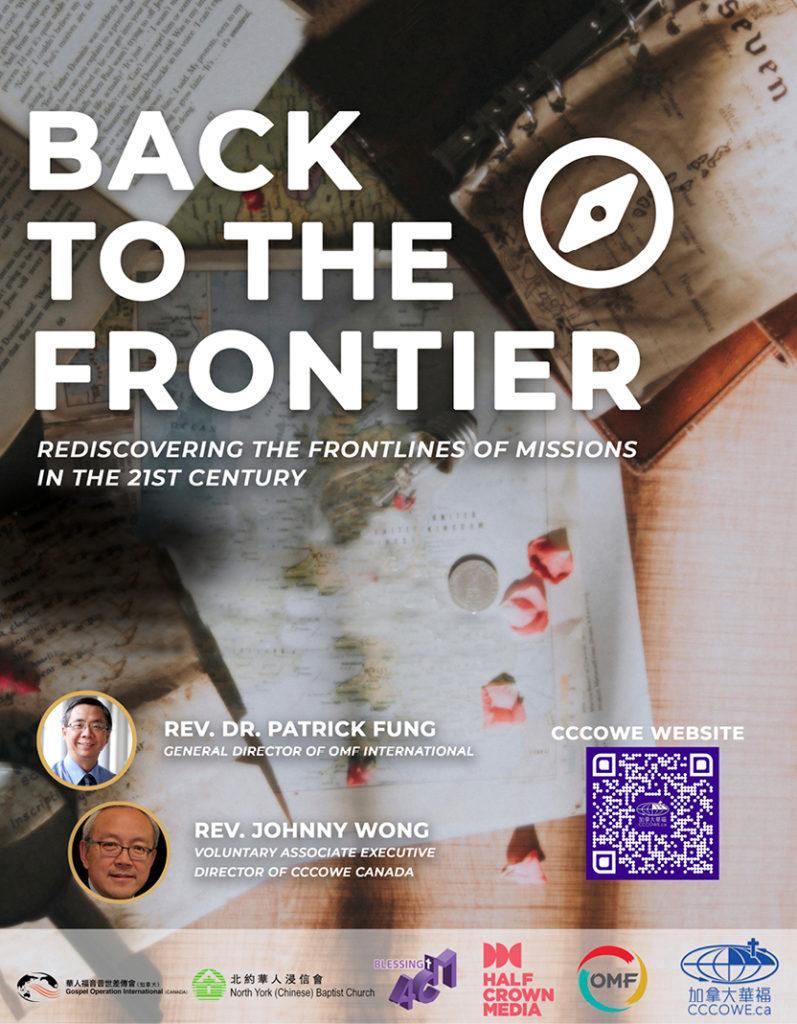


Breakthrough, Legacy, Response – Refocusing on Hudson Taylor
突破 , 傳承 , 回饋 -- 顧往瞻來聚焦戴德生
Reflection on Mission Leadership
BY Rev. Dr. Francis Tam
Executive Director, CCCOWE Canada
Leadership development involves learning from different stages and experiences of life, and is most important in missionary service. To truly understand the meaning of "Failure is the Mother of Success" is an absolute necessity in the reality of innovative mission leadership. “Failure” is a great teacher. The best spiritual leaders learn from their failures and experiences of grief in their personal and ministry life. A combination of diverse experiences in various adverse and traumatic circumstances, together with personal and relational experiences in the service of God, constitute a driving force for leadership learning and growth. However, how will the different stages of ministry life help us to understand what it takes to be an effective leader?

When the Taylor family first came to China at the difficult time of the Qing Dynasty, they encountered numerous setbacks - illnesses, the death of his wife and his children, persecutions, financial pressure, and people rejecting the Christian faith. The most notorious were the criticisms and accusations by other missionaries and co-workers for their choice to wear traditional Manchu clothing. In 1867, their eldest daughter died from meningitis. Then unity within China Inland Mission was threatened by dissensions and discords. At the time, the Qing Dynasty was on the brink of collapse due to the arrival of Western powers. In 1868, Taylor and his missionary group were physically attacked in the Yangzhou Rebellion, and the incident led to the intervention of the British Royal Navy. Fearing a possible war between the two empires, the British government tried to persuade Taylor and his team to leave China. Despite these threats, Taylor and the Mission persevered with their mission work. Tragedy struck Taylor again when his wife and their youngest child died in the same year. Grief and deteriorating health then prompted him to return to England to recuperate. This period could be regarded as the lowest point of Taylor's missionary life.
However, God opened a window when all doors were closed. In England, Taylor married his second wife and the family returned to China in 1872. In 1876, the Qing government was forced to sign the Treaty of Yantai. This turned out to be good tidings for Taylor and the China Inland Mission as their missionary work was legalized in China. Taylor and his missionary team seized the opportunity to penetrate deep into the heart of China, establishing many mission sites along the way. Thanks to his wife's efforts in England, British missionaries soon came to China in droves. Since then, the evangelizing work of the China Inland Mission continued to expand, establishing many mission sites and new churches. Later, American missionaries also joined Taylor's mission ministry in China.
To understand why some people can emerge from life’s adversities and become smarter and more effective leaders while others don’t, we need to understand how people learn when faced with challenges in new situations.
The first is to understand that failure gives us a second chance to learn. Failure of any kind always tells us something about ourselves and gives it the attention it deserves. If a person is insensitive and unresponsive, it's a sign that one might not know what one should know. Unfortunately, many do not take advantage of this second learning opportunity to respond with time-sensitive and appropriate reflection. Strategic actions that can turn the tide will then be lacking.

Second, when a person faces a setback, the immediate reactions are usually with shock, recognizing that one fails to meet self or other’s expectations, sensing rejection from other people, and anger for things not going as planned. Then followed by laying blames, denial of information and one’s own role and responsibility in the failing event. Eventually, one has to face and accept one’s vulnerability. Regrettably, failures and personal feelings are just part of being human.
What is the value of failure in the life of a serving ministry? Failure is a catalyst for change and growth. Without experiencing failures, leaders will never step out of their comfort zone, adjust their identities, or develop their empathy. Failures can motivate, initiate deep introspection, and force oneself to reassess personal perspective. Lack of empathy in leaders is common, and fortunately, increased empathy is a common byproduct of failures.
A man can live forty days without food, three days without water, and eight minutes without air. Without hope, however, he cannot survive for a moment in life. Facing the horrendous vicissitude in his ministry life, Taylor once said, "My path has never been easy. I have never been so happy in Jesus, and I am sure He will not let us down; but I have never trusted God so completely since starting my missionary work!” A leader who lets himself be consumed in the fire of crises is not a wise leader. The role of leadership is to stabilize crisis situations. Leaders must first of all trust in God’s given empowering strength in him. With rekindled hope, he will lead his team out of the valley of the shadow of death.
Failure is a recurring theme throughout the life stages of ministry. Paradoxically, if you never fail as a leader, you will never be completely successful. Do you agree that the quickest way to succeed is to double your failure rate? When faced with setbacks, don't let failure define and categorize you as a person. Don't look for scapegoats and laying blames on others. As a diligent learning leader, you should examine the causes that led to the failure, consult with your supervisor, coach, or other trusted peer; and consider creatively how things could be done differently in the future. Most important of all, hold fast to the divine calling from above.
Cross-cultural mission is by nature a very demanding ministry. It will be even more so in leading a large cross-cultural people team! Today we are thankful for the examples set forth by Hudson Taylor and five generations of his family in their faithful service to God. Through Taylor's missionary life experiences, we are reminded that it is the integration of trials and failures with honest efforts to leap above them that will cultivate and promote effective mission leadership, in serving and guiding the nations to the Gospel truth of Our Lord Jesus Christ.


